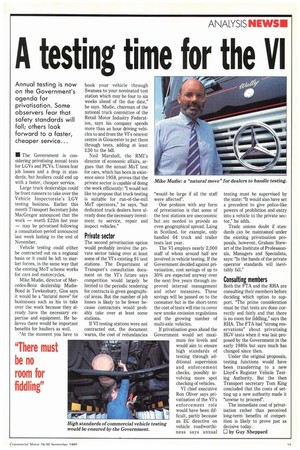A testing time for the VI
Page 17

If you've noticed an error in this article please click here to report it so we can fix it.
Annual testing is now on the Government's agenda for privatisation. Some observers fear that safety standards will fall; others look forward to a faster, cheaper service...
/ The Government is considering privatising annual tests for LGVs and PCVs. Unions fear job losses and a drop in standards, but hauliers could end up with a faster, cheaper service.
Large truck dealerships could be front runners to take over the Vehicle Inspectorate's LGV testing business. Earlier this month Transport Secretary John MacGregor announced that the work — worth £22m last year — may be privatised following a consultation period announced last week lasting to the end of November.
Vehicle testing could either be contracted out on a regional basis or it could be left to market forces, in the same way that the existing MoT scheme works for cars and motorcycles.
Mike Mudie, director of Mercedes-Benz dealership MudieBond in Tewkesbury, Glos says it would be a "natural move" for businesses such as his to take over the work because they already have the necessary expertise and equipment. He believes there would be important benefits for hauliers as well.
"At the moment you have to
book your vehicle through Swansea to your nominated test station which may be four to six weeks ahead of the due date," he says. Modie, chairman of the national truck committee of the Retail Motor Industry Federation, says his company spends more than an hour driving vehicles to and from the VI's nearest centre in Gloucester to put them through tests, adding at least £30 to the bill.
Neil Marshall, the RMI's director of economic affairs, argues that the annual MoT test for cars, which has been in existence since 1958, proves that the private sector is capable of doing the work efficiently: "I would not like to propose that truck testing is suitable for run-of-the-mill MoT operators," he says, "but dedicated truck dealers have already done the necessary investment to service, repair and inspect vehicles."
Private sector
The second privatisation option would probably involve the private sector taking over at least some of the VI's existing 91 test stations. The Department of Transport's consultation document on the VI's future says competition would largely be limited to the periodic tendering for contracts in given geographical areas. But the number of job losses is likely to be fewer because contractors would probably take over at least some stations.
If VI testing stations were not contracted out, the document warns, the cost of redundancies "would be large if all the staff were affected".
One problem with any form of privatisation is that some of the test stations are uneconoinic but are needed to provide an even geographical spread. Laing in Scotland, for example, only handled 64 truck and trailer tests last year.
The VI employs nearly 2,000 staff of whom around half are involved in vehicle testing. If the Government decided against privatisation, cost savings of up to 30% are expected anyway over the next five years through improved internal management and other measures. These savings will be passed on to the consumer but in the short-term the cost of tests will rise to cover new smoke emission regulations and the growing number of multi-axle vehicles.
If privatisation goes ahead the Government would set maximum fee levels and would aim to ensure high standards of testing through additional supervision and enforcement checks, possibly involving more spot checking of vehicles.
VI chief executive Ron Oliver says privatisation of the VI's enforcement role would have been difficult, partly because an EC directive on vehicle roadworthiness says annual testing must be supervised by the state: "It would also have set a precedent to give police-like powers of prohibition and entry into a vehicle to the private sector," he adds.
Trade unions doubt if standards can be maintained under the existing privatisation proposals, however, Graham Stewart of the Institute of Professionals, Managers and Specialists, says: "In the hands of the private operator standards will inevitably fall."
Consulting members
Both the FTA and the RHA are consulting their members before deciding which option to support. The prime consideration must be that tests are done correctly and fairly and that there is no room for fiddling," says the RHA. The FTA had "strong reservations" about privatising HGV tests when it was last proposed by the Government in the early 1980s but says much has changed since then.
Under the original proposals, testing functions would have been transferring to a new Lloyd's Register Vehicle Testing Authority. But the then Transport secretary Tom King concluded that the costs of setting up a new authority made it "unwise to• proceed".
The immediate cost of privatisation rather than perceived long-term benefits of competition is likely to prove just as decisive today.
El by Guy Sheppard








































































